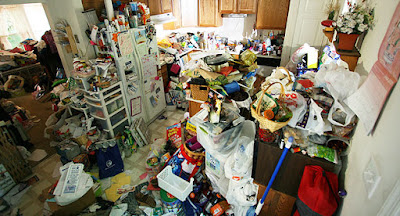 |
| Pic credit: flickr.com |
Hoarding is the persistent reluctance in discarding or parting with possessions, regardless of their value. This behavior usually has harmful effects - emotional, physical, social, financial, and several times even legal - for a hoarder and family members. Commonly hoarded items can be newspapers, furniture, clothes, household supplies and even food items. There are cases when a house is filled with so many pets that they’re often left uncleaned and uncared for and subsequently, they fall ill.
Hoarding is considered to be a derivative of Obsessive Compulsive Disorder (OCD). It is reckoned that about one in four people with OCD are also compulsive hoarders. In future, hoarding might be in a league of its own. In the meantime, it is a serious issue and people are opening up about the difficulty and problems hoarding causes them in their lives. It can be difficult to determine if someone is a hoarder or if they just like to hang on to things. One of the main determining factors to identify if it becomes a disorder is to know, whether or not, and to what extent,
the behavior has started negatively affecting daily functioning.
the behavior has started negatively affecting daily functioning.
Here are some of the recognized symptoms of hoarding:
- Cluttered living spaces
- Unable to discard items, regardless of their value
- Keeping stacks of newspapers, magazines, boxes or junk mail
- Shifting items from one pile to another without essentially discarding anything, even the things that need to be thrown out
- Acquiring unnecessary or useless items, including trash
- Difficulty in doing the daily activities, procrastinating and having a hard time making decisions
- Difficulty organizing items
- Perfectionism - Expecting everything to be flawless
- Over-attachment to possessions and experiencing discomfort when someone else touches or borrows belongings
- Limited or no social interactions
Reasons for hoarding:
People tend to hoard because they believe that the item will come in use in the future and hold it dear to themselves with a unique sentimental value to them. Sometimes they also consider the item as a memory of a person or an event, thinking that they will not remember the event without the item. Hoarding often causes anger, resentment, and depression among family members, and it can have a great effect on the social development of children. Unliveable conditions may lead to separation between couples or divorce, eviction from the property, even loss of child custody, and can give rise to some serious financial problems.




